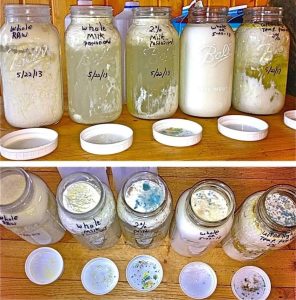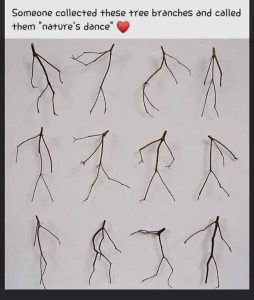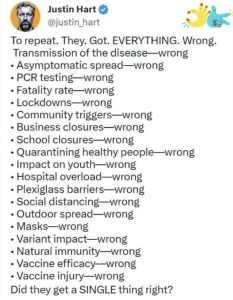
Jesse Watters takes a deep dive into the Wuhan lab leak theory in COVID and why it was dismissed on ‘Jesse Watters Primetime.’
https://www.youtube.com/watch?v=I08Skv1djgs&ab_channel=FoxNews

Tom's Blog on Life and Livingness

Jesse Watters takes a deep dive into the Wuhan lab leak theory in COVID and why it was dismissed on ‘Jesse Watters Primetime.’
https://www.youtube.com/watch?v=I08Skv1djgs&ab_channel=FoxNews

Weight Loss Tip Number 114 from How To Live The Healthiest Life:
Processed foods lack protein and cause increased caloric intake. Substitute protein for fast foods.
When you’re hungry and craving a quick snack, it’s tempting to make some instant noodles or reheat leftover pizza instead of cooking something healthy. However, enjoying these processed foods regularly may have a negative effect on your overall health.
Data reveals that at least two-thirds of American adults are either overweight or obese. At the same time, millions of people eat fast food every day.
According to a large-scale population study conducted by researchers from the University of Sydney (USYD), eating highly-processed (ultra-processed) snacks can promote overeating, contribute to unwanted weight gain and even increase your risk of developing chronic disease.
The study was published in the journal Obesity.
Processed foods lack protein and cause increased caloric intake
For the study, researchers examined data from more than 9,000 volunteers obtained by the Australian Bureau of Statistics regarding nutrition and physical activity.
After analyzing the data, scientists found that highly-processed and refined foods cause protein hunger, a condition that triggers overeating and contributes to obesity. The researchers said that the findings help to confirm the “Protein Leverage Hypothesis” or the theory that people overeat fats and carbohydrates because their body craves protein more than other nutrients.
Worth noting is the fact that the food consumed in Western diets contains lower amounts of protein, something highly lacking in processed foods. Additionally, processed foods continue to make up larger proportions of many people’s daily diets.
Dr. Amanda Grech, a postdoctoral research fellow at the University of Sydney‘s Charles Perkins Center, explained that as people consume more junk foods or highly-processed and refined foods, they continue to “dilute their dietary protein and increase their risk of being overweight and obese.”
David Raubenheimer, study co-author, a professor and the Leonard Ullmann Chair in Nutritional Ecology at USYD, confirms the negative effects of improper nutrition. “Obesity, diabetes, cardiovascular disease – they’re all driven by diet, cautioned Raubenheimer.
https://food.news/2023-02-17-processed-foods-protein-hunger-contribute-to-obesity.html

http://www.doctoryourself.com/omns/v06n19.shtml
“Children using anti-epileptic medication have reduced plasma levels of vitamin E, a sign of vitamin E deficiency. So, doctors at the University of Toronto gave epileptic children 400 IU of vitamin E per day for several months, along with their medication. This combined treatment reduced the frequency of seizures in most of the children by over 60 percent. Half of them “had a 90 to 100 percent reduction in seizures”. This extraordinary result is also proof of the safety of 400 IU of vitamin E per day in children (equivalent to at least 800 to 1,200 IU/day for an adult). “There were no adverse side-effects,” said the researchers. It also provides a clear example of pharmaceutical use creating a vitamin deficiency, and an unassailable justification for supplementation.” Ogunmekan AO, Hwang PA “A randomized, double-blind, placebo-controlled, clinical trial of D-alpha-tocopheryl acetate (vitamin E), as add-on therapy, for epilepsy in children”, Epilepsia, 1989 Jan-Feb; 30(1):84-9
“As I see it, a person’s culture represents his appraisal of the things that make up his life. And a fellow becomes cultured, I believe, by selecting that which is fine and beautiful in life and throwing aside that which is mediocre or phony. Sort of a series of free, very personal choices, you might say. If this is true, then I think it follows that “freedom” is the most precious word to culture. Freedom to believe what you choose and read, think and say and be with what you choose. In America, we are guaranteed these freedoms. It is the constitutional privilege of every American to become cultured or to grow up like Donald Duck. I believe that this spiritual and intellectual freedom which we Americans enjoy is our greatest cultural blessing. Therefore, it seems to me, that the fist duty of culture is to defend freedom and resist all tyranny.” – Walt Disney

STEP 1: Make Observations.
Raw milk is a living food with active ingredients.
Pasteurized milk is filled with dead bacteria, denatured proteins, destroyed enzymes, and more.
Raw milk can be utilized outside refrigeration, as has been done for centuries, to make many types of healthy dairy products.
However, when pasteurized milk is allowed to “grow” in a non-refrigerated environment, mold and other strange things appear.
STEP 2: Form a hypothesis.
When raw milk and pasteurized milk (organic or conventional) are left at room temperature, bacteria grows naturally.
Raw milk continues to be appear normal, be enjoyable, and be a safe product to consume.
Pasteurized milk becomes moldy and unsafe to consume.
STEP 3: Make a prediction.
Raw milk will become a sour cream or separated cheese-like product (safe to consume and enjoy).
Pasteurized milk becomes rancid and harmful to consume.
Raw milk will become an edible, enjoyable, product safe to consume.
STEP 4: Perform an experiment. (Picture Proof)
The 5 jars were all filled on the same day. I prefer not to reveal the brand name on the labels but two are conventional milk brands and two are organic milk brands. The whole milk is “Jersey cow” milk from cows that live on grass. Jars were all sterilized before the experiment. I tightened all the lids and then backed them off a half turn.
I have done this experiment before and I am absolutely stunned at how little remains of what is labeled “whole milk.” Isn’t this blatantly dishonest labeling? Additionally, I consistently see that the UHT (Ultra High Temp. Pasteurized milk) goes bad fastest.
STEP 5: Analyze the results of the experiment.
See mold growth/ pictures. The mold on lids show an estimate for the quantity of mold growth inside each jars.
Mold Growth Levels:
Raw Whole Milk: NO MOLD
Pasteurized Whole Milk: Medium mold levels
Pasteurized 2% Milk: HIGH mold levels
Pasteurized Organic Whole Milk: Medium mold levels
ULTRA High Temp Pasteurized 2 % Milk: EXTREMELY HIGH mold levels
STEP 6: Draw a conclusion.
Drink raw milk. It is a living, bio-diverse perfect food.
(Raw milk is controversial, heavily regulated by the government, but many swear by the health benefit. Highly recommend A2 dairy only.)
This is not our weekly newsletter, but rather an urgent call for action from UK Citizens.
Action in the form of a consultation response that might take around 15 minutes to complete is required before the close of Wednesday, 1 March 2023 – in 2 days time.
The response is related to a UK government consultation that appears to be part of a very slippery slope towards authoritarian or even totalitarian control of populations.
While this consultation is specific to the UK, it should be of interest to anyone concerned by the recent inroads of governments which have chosen to use the ‘state of emergency’ engineered around COVID-19 to subjugate rights and freedoms based on personal information or choices.
In health, and freedom
Rob Verkerk PhD
Founder, executive & scientific director

Dr Jack Kruse says, “Always pick nature over a man made pool or watering hole. Your colony of mitochondria will love you for it!”

I recommend you read this article and start taking steps to reduce your exposure to a banking crisis.
